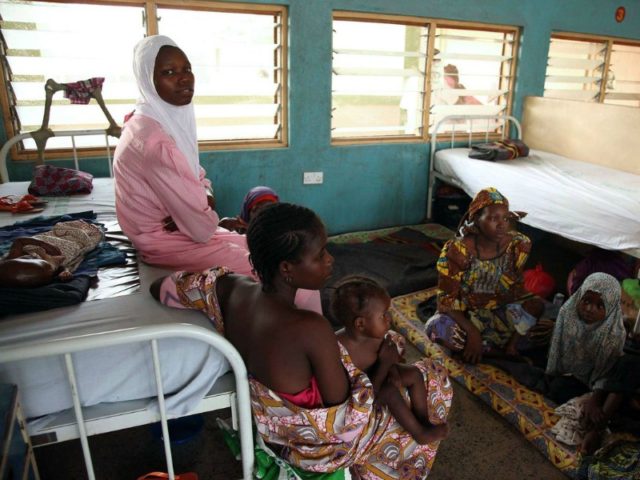The Nigerian army issued a press release on Wednesday announcing that it had rescued 11,595 civilians held hostage by the Islamic State-affiliated terrorist organization Boko Haram and asserting once again that the group is close to total defeat.
Nigeria has repeatedly asserted that Boko Haram has been “defeated,” though the group continues to stage suicide bombings, and the Nigerian military has been unable to rescue the over 200 girls kidnapped from the northeastern town on Chibok in 2014 — the abduction that made Boko Haram an international news story.
Nigeria’s Vanguard newspaper cited army spokesman Sani Usman as confirming the liberation of the over 11,000 hostages through operations that also included work by forces in neighboring Cameroon. About 10,000 of those freed were refugees saved by Cameroon traveling back into Nigeria. “In continuation of the clearance and mopping up operations of the remnants of Boko Haram terrorists in various parts of the North East geo-political region, troops have rescued no fewer than 11,595 persons held hostage by the terrorists within the last one month,” he claimed, adding that most of these have been moved to refugee camps throughout northeast Borno state. Borno is the home state of Boko Haram; most of the group’s remaining members are believed to be hiding in Borno’s Sambisa forest.
Among those recently freed is an 80-year-old man identified as Mallam Ibrahim Matuk. It is unclear why Boko Haram chose to keep him captive, as the group typically tends only to keep female or child hostages (most of the males under Boko Haram activity are boys kidnapped with their mothers or born out of the rape of female captives).
The liberation of these hostages is one of a series of army press release information promoting the image of Boko Haram as a desperate coalition of young men seeking to preserve a ruined terrorist organization. Among those embarrassing reports is one published Thursday by Nigerian newspaper Leadership, announcing the arrest of five men known to provide sexual performance enhancers to Boko Haram jihadists, including Tramol, Lamumol, and Viagra. The men were also caught peddling razor blades, Maggi soup packets, and shoes to the jihadists hiding in Sambisa.
While the Nigerian military continues to announce its progress against the jihadist group, many remain skeptical of the claim that Boko Haram is no longer a threat. April 14th marked the second anniversary of the abduction of the girls of Chibok, Borno, who remain in captivity. That day, Boko Haram jihadists released a video showing 15 of the girls, positively identified by their mothers. The girls appeared gaunt but in stable health and claimed to be well in the video. The military has not claimed to have any evidence that furthers the mission to rescue them in years.
A month after the two-year anniversary of the Chibok abduction, the leaders of the nations surrounding Lake Chad — Nigeria, Chad, Cameroon, and Niger — will meet in Abuja, the Nigerian capital, to discuss a path forward for the fight against the terrorist group. The International Crisis Group, an NGO operating in the region, issued a report warning nations against preemptively announcing the success of any operations against Boko Haram, or the overall defeat of the group.
“Even if they are made to abandon all territorial pretensions in Nigeria’s northeast and the Lake Chad area, or are forced to abandon their guerrilla war, some Boko Haram militants at least are likely to seek to continue their insurgency in some form, probably through terror attacks,” the group warned, adding that “consolidate regional and wider international cooperation” should be the goal of the summit.
In a statement to the press, Nigerian Chief of Defence Staff (CDS) Gen. Abayomi Olonisakin reiterated that the government is “really committed to ensure that we clear them [from Nigeria] as soon as possible,” an implicit admission that President Muhammadu Buhari’s claims to victory against Boko Haram have been hollow. Buhari announced in December that “technically, we have won the war” against Boko Haram, vowing a new stage of operations focused on rescuing the Chibok girls, not necessarily fighting Boko Haram terrorists.
Yet Boko Haram have continued to stage suicide attacks. While their ability to raid villages in cars or on horseback has been severely diminished, they are using their captives as suicide bombers to terrorize markets and mosques near Maiduguri, the capital of Borno. The result has been that many northeastern communities have rejected rescued female captives, fearing that they have been brainwashed and have returned to their communities to engage in suicide bombings.
While the Nigerian government has established a rehabilitation facility for remorseful Boko Haram terrorists, no equivalent facility exists to reintegrate former Boko Haram captives into their communities.

COMMENTS
Please let us know if you're having issues with commenting.